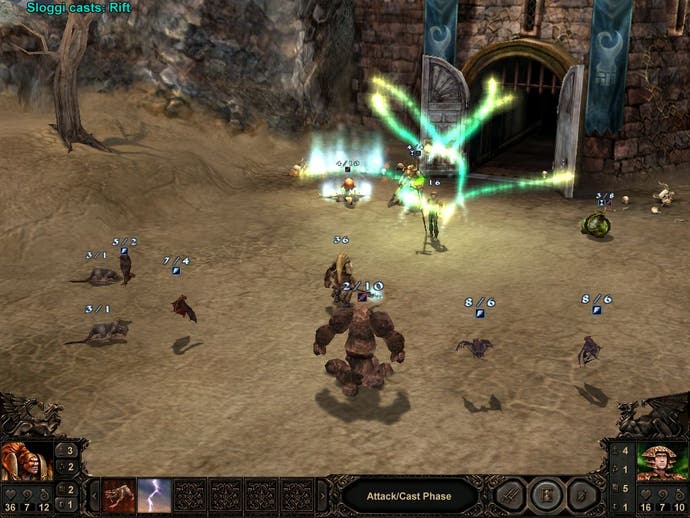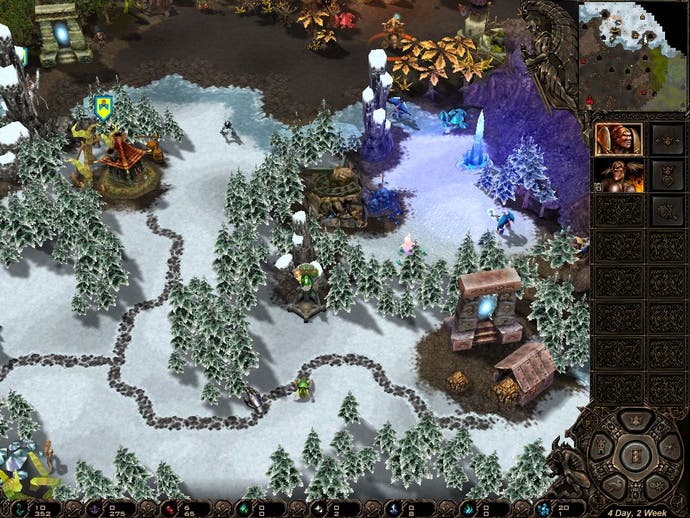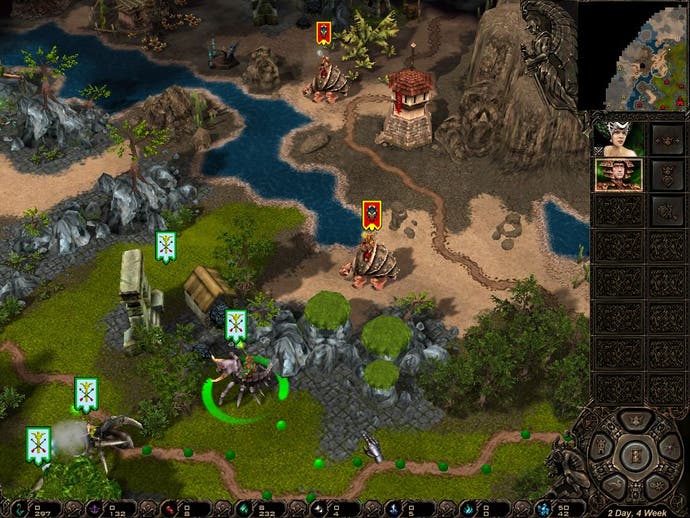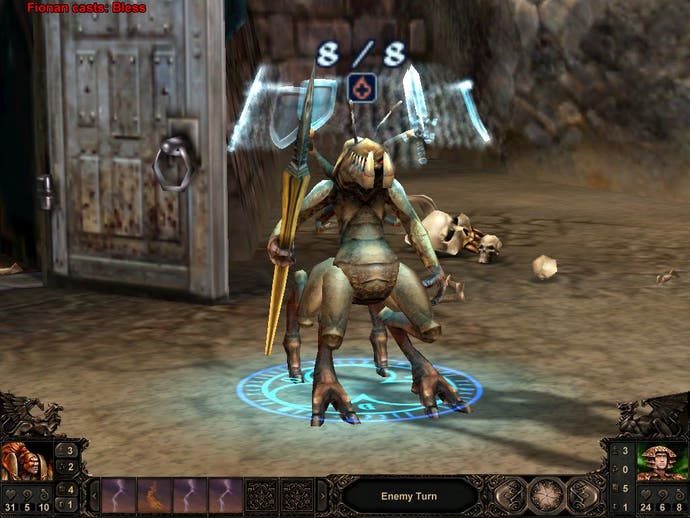Etherlords
Review - Heroes of Might & Magic meets Magic : The Gathering in this turn-based strategy game

Heroes Of The Gathering
Take one copy of Heroes of Might & Magic. Mix in two decks of Magic : The Gathering. Garnish with an impressive 3D graphics engine, add a liberal sprinkling of eye candy, toss in a bag full of freakish looking monsters and then simmer for eighteen months. Et voila, Etherlords. On paper it sounds like a great concept, combining the addictive turn-based strategic gameplay of the Heroes games with the equally addictive card-based tactical battles of Magic. As usual in this kind of game you begin each mission with one or more hero characters which you guide around a map of the world dotted with resources, buildings and monsters. Some of these buildings will provide you with resources each turn, while others boost the abilities of your hero, or allow you to spend your resources on buying more powerful spells for them to use. These spells come into play when you attack a monster or enemy hero. Rather than taking an army of creatures around with you, as you would in Heroes or Age of Wonders, in Etherlords you summon new creatures for each battle using the deck of spell cards you have amassed. Each of the game's four unique races has its own set of cards, which sadly can't be mixed. Some of these conjure up bizarre looking monsters, from your run of the mill kobolds and giant rats to ornate mechanical lifeforms and insect-like mantids, while others can be used to enhance the abilities of the creatures already under your control or to weaken the enemy. The wide range of cards included in the game gives you plenty of scope for creating your own fifteen card decks, especially once you take into account the fact that some creatures will boost the abilities of similar monsters under your command. It's all very bewildering at first sight, and you may want to indulge in a few practice duels to learn the ropes before you dive into the game's main campaign.

Hard, Harder, Impossible
And this is where things start to break down. Put simply, the campaign missions are far too hard, and from about the third mission onwards most people will be struggling to stay alive, let alone to win. However quickly you move your heroes around the world, the enemy always seems to have the upper hand when it finally emerges from the fog of war. This problem is made worse by the fact that the difficulty settings simply don't work. Whichever of the five levels you choose to play on, the enemy will always behave in exactly the same way and usually end up with a hero which has more experience and better spells than your own, making them very tough to defeat. All you can do is focus on developing one hero as rapidly as possible and hope you can keep up. If you succeed you kill the enemy's lead hero and the rest of the mission is mopping up. If you fail the enemy slaughters your lead hero and all you can do is quit and start again from an old save game. In fact, the only thing which your choice of difficulty setting actually changes is how tough your encounters with neutral monsters are, which is helpful in the early stages of a mission but not really enough to make the campaigns playable for less experienced gamers. And to make matters worse, you can't even carry your heroes from one mission to the next as you would in Heroes of Might & Magic - every time you have to start out from scratch, which quickly becomes irritating as you fight the same low level monsters with the same low level spells, desperately trying to gain experience faster than your opponent.

Abbynormal
Conversely, the stand-alone missions are far too easy on any difficulty setting, thanks to the weakness of the AI. Missions revolve around castles; destroy an enemy castle and their faction is removed from play, lose your own and it's game over. Which would be fine, except that your opponent is utterly incapable of either defending his own castle or attacking yours. Often they ignore your heroes entirely and carry on hoovering up resources or attacking neutral monsters as if you weren't there at all, which makes most of the single missions a walkover. Your enemy also seems to be remarkably reluctant to use any of the shops scattered around the map to buy new spells for his heroes in the stand-alone missions, which makes them very easy to defeat once you've built up your own deck, even if they have managed to out-level you. The AI doesn't have this problem in campaign missions (quite the opposite in fact - enemy heroes build up powerful decks frighteningly early on), so either the game is just plain broken or the AI cheats in the campaigns and uses the fog of war to disguise this. Either way, it's not very impressive. The card-based combat system has other problems as well. You begin each battle with six cards drawn at random from your deck of fifteen, and then get dealt one more card each turn. Unfortunately this means that bad luck can leave you with a totally useless hand for a few turns, and although you can minimise this risk by keeping a varied deck, sometimes things just don't work out and all you can do is hit "surrender" and reload from the last autosave position. This is a particular problem for the Kinets, whose basic deck is horribly under-powered compared to the other three races at the best of times. Kinets have no direct attack spells and can't summon any creatures from their starting deck until the third turn. By which time your opponent probably already has a small army of creatures waiting to tear your hero limb from limb. They make up for this later on in the game with some incredibly powerful high level spells, but you'll be lucky to get that far.

Back And Forth
Even more annoying is the fact that, apart from the basic spells you start out with, every card in your deck has a limited number of charges. Once these are exhausted you can no longer cast that spell, leaving you dashing back to the nearest "portal" to buy fresh supplies after every few battles. You can't customise your deck before battles either - the only way to change the cards you hold is to travel to the appropriate building and buy some new ones. As the cards you want may be spread between two or three shops scattered across half the map, this makes changing your deck an incredibly time consuming business, and you can't even swap spells between heroes to speed things up. As a result the combat system is far less dynamic than it really should be, and if you find yourself up against an enemy whose deck includes cards which render yours useless, you're basically stuffed. It's not all bad news though. Battles can be very enjoyable, and the wide range of cards and the interdependencies between the various spells gives them real tactical depth, while the swooping camera views and over-the-top special effects make them a joy to behold. Until you switch off all the options to speed things up, anyway. It's just a pity that the missions don't allow you to properly explore this side of the game, leaving it to duels (both online and against the AI) to show you what Etherlords could have been.
Conclusions
We had high hopes for Etherlords, but sadly most of the niggles we had with the beta code we played six months ago still haven't been fixed. The AI is a mess, the missions seriously unbalanced, the card purchase system tedious and the learning curve almost vertical. Throw in a dodgy script and some of the worst voice acting ever to grace a computer game and you're left with a potential classic which falls far short of its potential.
-
Etherlords preview (August 2001)
Etherlords screenshots

